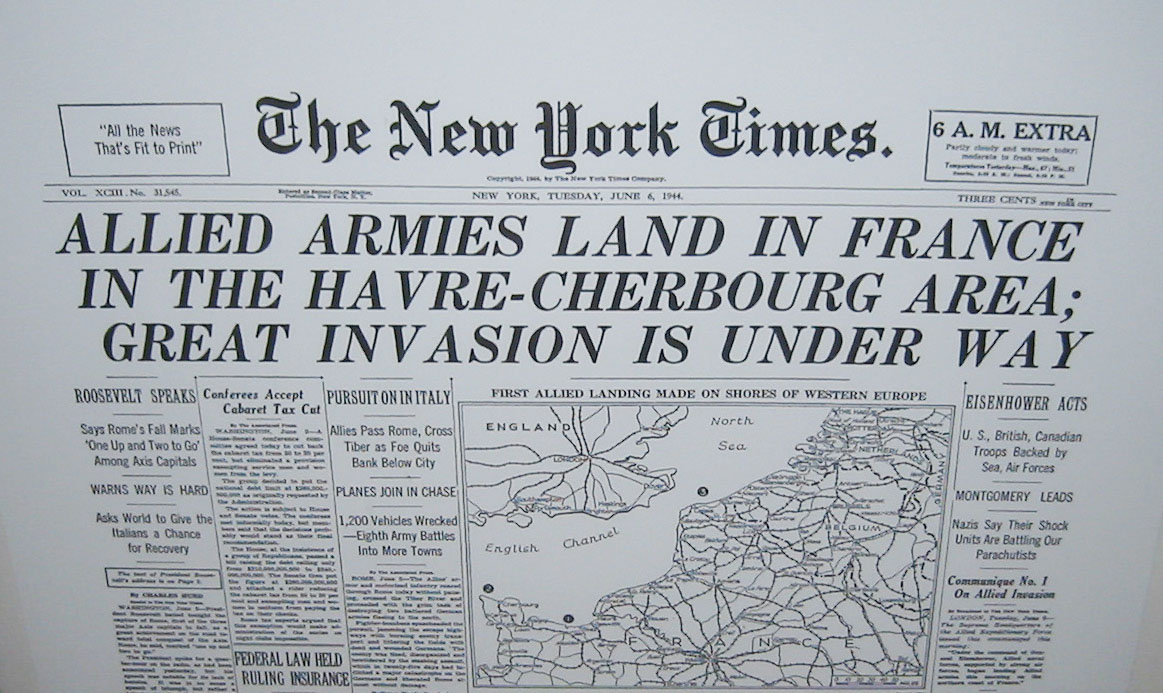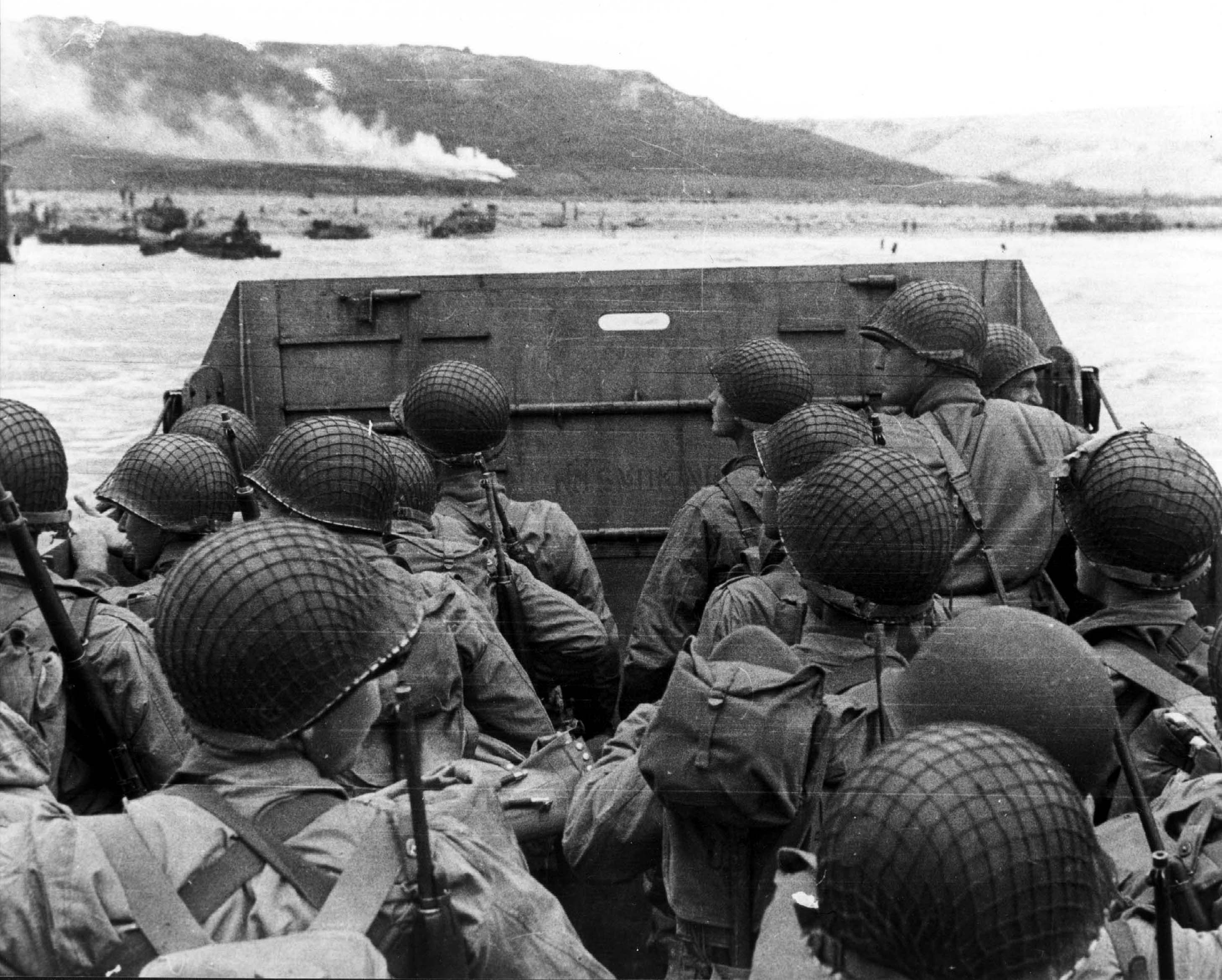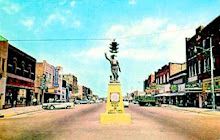The World War II invasion of the Normandy coast of France, called D-Day, was at 6:30 a.m. at the invasion site on the Normandy coast of France, June 6, 1944. This story will be limited to descriptions of my experiences and not about world history, so it will primarily be limited to a descriptions of my Henryetta activities and experiences on or related to D-Day.
A 60 page story I wrote few years ago about all of my memories of World War II contains about 9 pages devoted to D-Day and its planning and action. It is on file with the Henryetta Historical Society, and is available for those with an interest in reading more about D-Day.
 While some may not agree with me, I personally believe the June 6, 1944 D-Day invasion of the Normandy coast of France was the largest undertaking, militarily or otherwise in the history of the world. It was the day the allied forces, primarily America, England and Canada, began the European part of the conquering of the German Nazis led by Adolph Hitler.
While some may not agree with me, I personally believe the June 6, 1944 D-Day invasion of the Normandy coast of France was the largest undertaking, militarily or otherwise in the history of the world. It was the day the allied forces, primarily America, England and Canada, began the European part of the conquering of the German Nazis led by Adolph Hitler.Allied forces were already in the Italian part of Europe and were fighting Germans there, but to end the war, we would have to take the German homeland, itself.
To set the stage for readers, the allied forces did very thorough planning for D-Day, which we civilians had been expecting since early 1944, and maybe a little longer than that, and it turned out to be outstandingly successful. When it actually started on D-Day, we had over 3,000 large war ships at the Normandy coast to start bombarding the German coastal defense.
"D-Day" and "H-Hour" are terms used for logistical and planning purposes. There were many D-Days during WWII, but the invasion of the Normandy Coast of France is the one people mean when they talk of the World War II D-Day Primarily, D-Day and H-Hour are logistical names given to "the day" and event planned such as an invasion or attack, is to take place and "the Hour" of that day when they will happen.
Since this story of about my experiences in Henryetta on D-Day, I won't discuss those terms further. Another thing I won't give the details about is that D-Day was originally planned to be June 5, but rough seas caused General Eisenhower, the overall commander, to delay it and then take advantage of a short period of time on June 6 when the landing risk would be a little, but not much, less.
Had it not been June 6, it would have had to be delayed until the tides were right two weeks later, and there were even rougher seas starting June 19, which would have delayed the invasion further and cause or permit many things to take place that would be to the German advantage.
To emphasize how much we were anticipating it here at home, without knowing when or where it would be, the Free-Lance had a contest where people could guess the day and the hour would initially land on the beaches, with the person who came closest to receive a U. S. War (now Savings) Bond. If I ever knew who won the bond, I don't recall it.
 6:30 a.m. at the French invasion sit in Normandy, was 11:30 p.m., June 5 in Henryetta but we naturally didn't know the invasion had taken place until the next day.
6:30 a.m. at the French invasion sit in Normandy, was 11:30 p.m., June 5 in Henryetta but we naturally didn't know the invasion had taken place until the next day. June 5 was the 14th birthday of an HHS classmate, Jerry Nell Hart (now Jerry Nell Erwin living in Jenks.) I had become 14 just sixteen days before, and we'd just finished the 8th grade.
June 5 was the 14th birthday of an HHS classmate, Jerry Nell Hart (now Jerry Nell Erwin living in Jenks.) I had become 14 just sixteen days before, and we'd just finished the 8th grade. Jerry Nell's mother had a party for about 20 or so of us in her back yard on Jerry Nell's birthday. We probably weren't thinking of the coming invasion at the party, but it must have been in the back of our minds because we had been anticipating it to take place anytime for at least several months. The party ended about 9 or 10 p.m., and pre-invasion bombing, paratroop drops and glider landings had already started at Normandy, but we didn't know it.
Henryetta's single major fire and other warning siren on top of the old Clark-Darland store (now Burnett's) on the southeast corner of 5th and Main went off about 1:30 a.m. All at my house woke up and immediately thought the invasion had started. My father turned on the radio, which usually didn't air anything that late back then, and it was airing early reports of the invasion.
They really gave very information except that the invasion had started and many of our troops were seasick because of rough seas.
An hour or two later, Mrs. Si Perkins, wife of the editor of the Free-Lance, called on the phone. She said they were publishing an "extra" (I think it was the first extra the Free Lance ever printed) and I was one of six of their 30 paper boys they'd give the papers at 6:30 a.m. to sell and keep all we got for them.
So I sold extras, primarily by waking some people up by yelling something like ‚"Extra, Extra, it's D-Day" and knocking on doors of my route customers on Gentry from Sixth to Highway 75 and then back to Third on Cummings ì including both of the south and north sides of the block around the long ago high school, gymnasium, junior high, Washington and band building.
I'd have done better if I'd spent more time on Main Street to sell them as people arrived uptown that morning.

As it was, I sold about 40 at 5 cents apiece, and Richard Abrams, manager of Long Bell Lumber at Fifth and Trudgeon (now the site of the Post Office) gave me a dime and told me to keep the extra nickel the first and only tip I recall ever receiving.
When I got home about 9:30 a.m. the radio was all invasion news. A message from General Eisenhower told of the invasion. It was late in the day at Normandy by then, and things were beginning to look successful, but there was still risk. Then there was a message he'd recorded to be released if the invasion was a failure, and in it Eisenhower took full responsibility for failure, but we knew this wasn't the real message. President Roosevelt came on and said a prayer for our success and the safety of our soldiers. At noon, they lightly tapped the Liberty bell on a national broadcast at the first time it'd been rung since 1926 on the 150th anniversary of the Declaration of Independence. Except for the loss of lives, it was a great day!
 So that covers my personal D-Day activities, but I must describe an invasion-related matter that bothered me for 27 years. Saturday June 3, 1944, I was swimming at Nichols Park (just three years after it was opened) where our great HHS coach Marion Anglin ran the bath/concession house in summers.
So that covers my personal D-Day activities, but I must describe an invasion-related matter that bothered me for 27 years. Saturday June 3, 1944, I was swimming at Nichols Park (just three years after it was opened) where our great HHS coach Marion Anglin ran the bath/concession house in summers.Radio music was playing on a PA system and about 4 p.m., I was at the diving tower and heard a break-in announcement that the invasion had started. When I got home, I told my parents, and they hadn't heard it. I told others, and they hadn't heard it. My younger sister, Dora, was at Nichols Park with me and she didn't hear it.
I knew I'd heard it, but nobody else did, so I wondered if I was nuts until 1971 when I read, in a daily newspaper column that told of past events for which that day was an anniversary, that a London based war correspondent at a teletype machine he thought was not turned on to transmit messages, was practicing the message he planned to send when the invasion actually took place, but the machine was on and the message went out. Eisenhower's staff immediately heard it and put out the word to all places that received it that they were not to mention it or even the fact that it was a mistake. It was to be as if it had never happened. It might seem strange today that everyone cooperated, but in WWII, if Eisenhower said something, everyone paid attention. So in 1971, I learned I wasn't nuts at least about this.
Then, in the spring of 2004, after being at Normandy and its beaches a couple of weeks before D-Day's 60th anniversary, my wife, Donna, and I went on a two week cruise and on days when there were no shore excursions there were ship activities. Since it was near D-Day's 60th anniversary, there was a series of lectures about the invasion planning by historian Martin Blumenson, who'd been in Eisenhower's London headquarters during its planning. At his final lecture, I asked if he knew of the accidental teletype message. He said he knew the man who sent it and that the man felt terrible about it, but General Eisenhower knew he didn't send it intentionally and just told him to quit practicing. I have never encountered or learned the identity of anyone else who heard the June 3 radio message, but with all the millions in the U. S. there must have been some others.
June 4, the allies had captured Rome, but with all the anticipation of D-Day, it was almost a nonevent at home. I'm sure I knew it, but was anticipating D-Day so much that I don't recall even knowing of it that day. Maybe I was still confused about why the invasion hadn't taken place June 3, like I'd heard it had.















